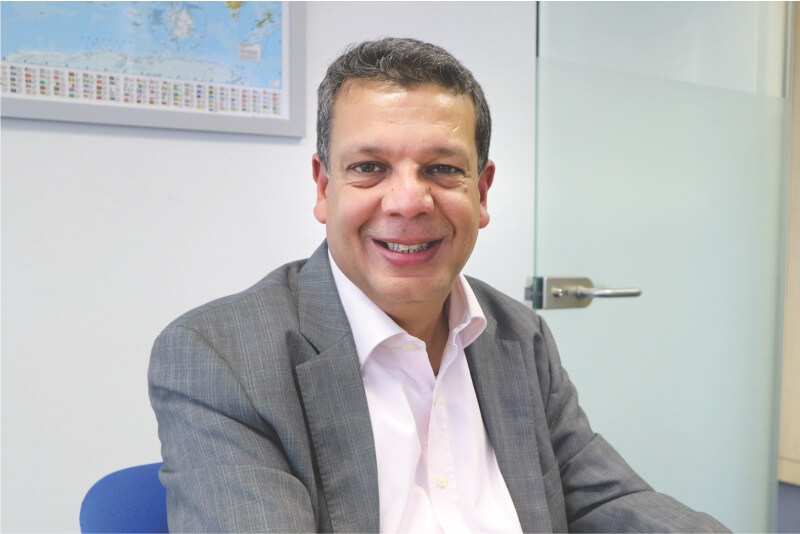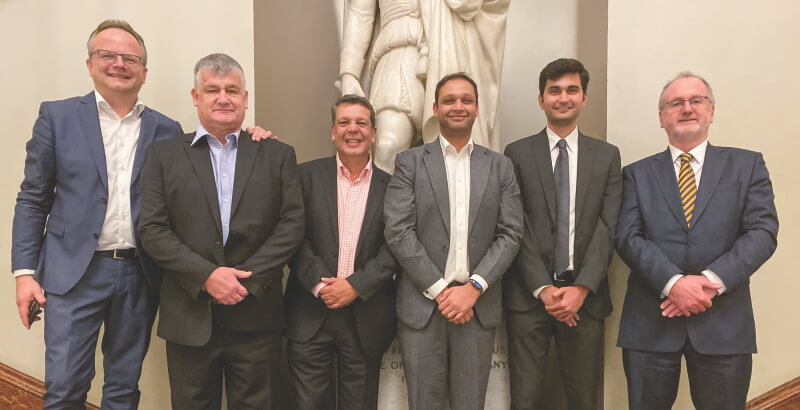“We have time honored associations selling to all major customers in India. India is and will remain a major market for Ekman both on the pulp as well as the recovered paper side… We believe that the prospects of Ekman in India are very encouraging.”

Mr. Pankaj Chowdhary, Director, Ekman Recycling Limited presents an overview of Ekman Group, its subdivision – Ekman Recycling Limited, their strategies for a consistent supply to the customers, and the outlook on the Indian paper industry, in a conversation with Paper Mart. Further, he also explains the impact of the pandemic on the company and their future roadmap.
Paper Mart: To start with, could you please give us a glimpse into the business journey of Ekman Group and elaborate on its presence in the paper industry?
Pankaj Chowdhary: Ekman Group is amongst the largest forest products trading companies in the world. We have a large recovered materials division which ships about 1.4 million MT of recovered paper and secondary rolls globally.
Ekman Recycling Limited United Kingdom is an Ekman Group company. Ekman & Co AB had acquired Reliance Fibres Limited in 2016 and the company’s name was changed to Ekman Recycling Limited in 2018. Ekman Recycling Limited is one of the largest exporters of recovered fibre from the UK to a number of countries around the world. Our prime markets are India, Indonesia, Thailand, Vietnam, Malaysia, and Pakistan through the way of deep sea containers. We also supply material to Europe in trailers. The company is licensed as Upper Tier Brokers registered with the Environment Agency and is licensed to export recovered paper from England, Wales, Scotland, and Northern & Southern Ireland.
“Ekman Recycling Limited was nominated for the ‘Best Paper Recycling Business of the Year’ award.“
Ekman Recycling Limited is a member of The Recycling Association UK, and in personal capacity, I am a member of the Board of Directors of the Association. Recently, Ekman Recycling Limited was nominated for the ‘Best Paper Recycling Business of the Year’ award. The company was founded by me in the year 2004 and then, it was subsequently acquired by Ekman Group, and I continue to lead the company as its Managing Director.
PM: Could you please describe the solutions offered for the pulp and paper industry?
PC: We export some of the major grades of recovered paper, for example, OCC 95/5, OCC 90/10, hard mix, soft mix, multigrade, news & pams, and other special grades from the UK and other European countries.
PM: Considering the surge in the paper-based packaging market due to the awareness of the environmental and social advantages of this type of packaging; what is your outlook regarding the future prospects and potential of the segment in India? How do you see the market evolving in the future?
PC: The Indian packaging markets will grow exponentially and quickly over the next 5-10 years, albeit, India is one of the lowest per capita consumers of packaging. Moreover, the online distribution channel has led to a huge change in consumer behavior and the sustainable micro packaging has emerged as a completely new sector (which we call the Amazon effect) and also, there’s been a huge substitution with plastic.
PM: Recovered materials are a major area of growth and a key segment of Ekman’s business, what are your various strategies to ensure a consistent flow of materials to the customers?
PC: We have hugely invested in our company in putting in place the right purchasing team – which possesses a lot of market information and at Ekman, we believe in building long term relationships with our suppliers.
“We have hugely invested in our company in putting in place the right purchasing team – which possesses a lot of market information and at Ekman, we believe in building long term relationships with our suppliers.“
Our quality inspection team is equipped with latest and state-of-the-art testing equipment and is continually on the move for conducting quality and specifications checks. Our supplies adhere strictly to EN643, i.e. the European standards for the supply of recovered paper. Ekman’s logistics team has a dedicated office in Leicester (in the middle of the UK). The team is able to swiftly move material from anywhere in the UK to any corner of the world. In addition to that, we have invested in IT and communication infrastructure which has allowed us to continue business right through the pandemic.
PM: Since Ekman Pulp Division is the world’s largest independent paper trader present in more than 100 countries and providing a range of recovered paper grades; how do you view the prospects of the Company in the Indian paper industry?
PC: Ekman has already been associated with the Indian markets for many decades. We have time honored associations selling to all major customers in India. India is and will remain a major market for Ekman both on the pulp as well as the recovered paper side.
The distribution channels for the pulp and recovered paper are separated in India for Ekman, and we have long-established relationships with the customers which make Ekman Group a major supplier to India. We believe that the prospects of Ekman in India are very encouraging, and we envisage long-term sustained growth.
PM: Volatility in global recovered paper markets has increased over the last few years, never more so than in 2020-21 – what are the factors that are influencing these price increases?
PC: In the short term, there has been a bit of a panic-like situation owing to the volatility of the markets, however, the long-term approach is paper markets, especially packaging, which is very sustainable and will continue to grow. Once the pandemic period is over, the markets will stabilize; still, with long term demand and the global shortage of fibre, we may expect a new normal.
PM: How the COVID-19 pandemic has affected the recovered paper industry and how do you foresee the future?
PC: The outbreak of the pandemic has increased the demand for recycled and virgin fibre. Since the collection of recovered fibre has been short, the prices have increased and so has the cost of freight. In the long term, the paper industry has a bright future especially in emerging markets, the industry will be driven by packaging, and as it seems, the print media will continue to shrink.
PM: As per the Confederation of European Paper Industries, India is one of the leading destinations for most of the waste paper from the US and Europe for recycling purposes. What are the regulations for the import of waste paper in the country and the challenges as the demand for waste paper is increasing every year?
PC: Any waste shipments come with legislation. In the UK, we are very cautious of what we export and we strictly adhere to the environmental laws and legislations. In fact, Indonesia has introduced diligent inspections and so will Malaysia in the coming future. As a matter of philosophy, we have no objections to the same as long as the legislation and inspections are undertaken with proper consultations with the industry.
Since the Indian paper industry needs the import of recovered paper, the Indian Government should support the industry by not imposing any un-practical processes or quotas. We welcome any legislation or inspection process which is done with consultation with the industry, and which is for the benefit of the industry, especially if it can remove malpractices in waste shipments.
PM: Recently, the Material Recycling Association of India (MRAI) had put forth the idea of setting up “recycling zones” and “shredding centres” that can become hubs of scrap management. How do you think this proposal is favorable in the context of the Indian paper industry?
PC: Having “recycling zones” or “shredding centres” is definitely a good idea; however, the Indian paper recycling industry is fragmented and the concept and system of waste management has not yet evolved in India as a major industry. A lot of investment is required in India, and the largest investment in India should be made in educating the large young population of India on “how to recycle” and to inculcate recycling as a habit – this will bring about monumental change.
PM: How do you view the Indian pulp and paper industry with respect to the prospects of different types of paper? Also, what is your viewpoint with respect to capacity expansions, quality enhancement, and productivity improvements in the pulp and paper industry in India?
PC: In the long term, the paper industry has a bright future especially in emerging markets. The industry is projected to be driven by packaging, the print media will continue to shrink, the hygiene products and healthcare products will continue to see a robust demand.
“A lot of investment is required in India, and the largest investment in India should be made in educating the large young population of India on how to recycle and to inculcate recycling as a habit – this will bring about monumental change.“
In terms of quality enhancement and productivity, it should be noted that while India has many mills, the industry is still fragmented and needs consolidation. The consolidation will bring about large economies, and enhancement in quality and productivity. For instance, we have still not seen any paper mill setting up large machines with production capacity of 500 TPD or above which has now become a norm in other Asian nations.
PM: With respect to the crisis brought by the pandemic, what has the impact been like on the company and the different resilience strategies which have enabled you in managing in the crisis?
PC: The pulp and paper industry has witnessed a paradigm shift in terms of demand. In particular, the demand for packaging has catapulted. At Ekman, we have invested heavily in remote working and efficient communication has been a key to our overall strategy. Moreover, our global network has enabled us to continue working in many markets despite the crisis brought by the pandemic.
PM: Since the Group is active globally in a wide spectrum of packaging grades, how do you view the growth opportunities? How well-positioned do you view the Company to be, to capitalize on the opportunities? Moving ahead, what are the goals of the Company in terms of further expansion?
PC: We are uniquely well-positioned and prepared for the markets to grow further. As I’ve already mentioned, the growth will be led by the packaging and hygiene products. As it seems, paper is a sustainable, non-polluting and recyclable product which will continue to be in demand.
The goal of the company is to continue to expand its market reach in various markets, especially in the emerging markets. We will continuously strive to be the number one supplier of forest products in the world.
PM: Any concluding thoughts that you wish to add to the interview?
PC: The paper industry has a sustainable and bright future and the recyclability of paper makes it one of the most exciting businesses to be in, despite being one of the oldest industries in the world. India will continue to be a favorite destination for Ekman Recycling Ltd for business.




